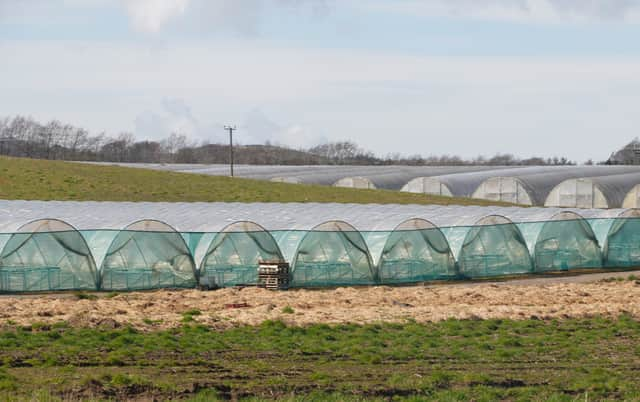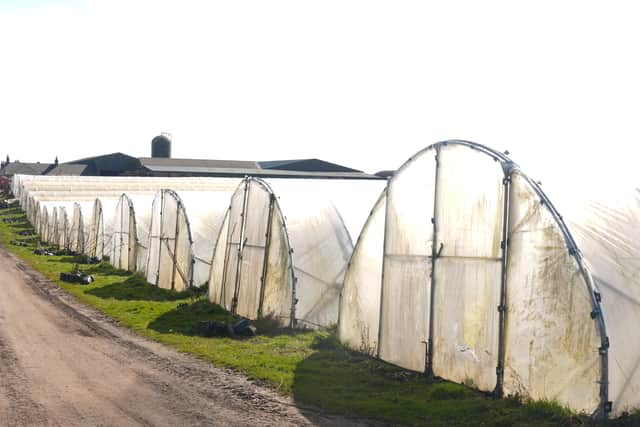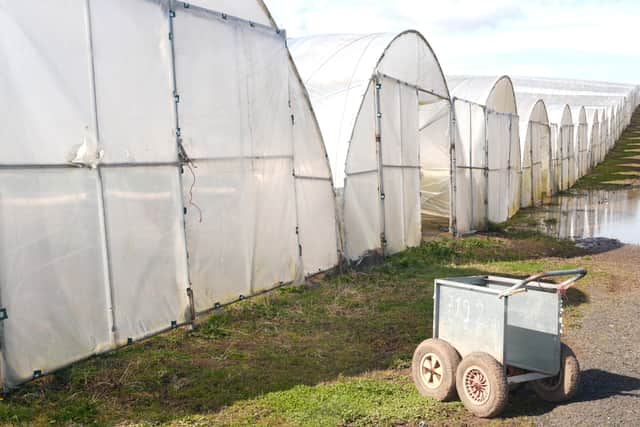Easter deals and national wage increase show 'sorry state of affairs' for Scottish fruit and veg growers


Fresh fruit farmers have said morale is at an all time low ahead of the picking season after cheap Easter deals on food splashed across shelves and hikes in labour costs came into force within the same week.
Some of those in the British growers industry are on their last legs, with businesses having already shut up shop because of the impact of labour shortages in the aftermath of Brexit and during the Covid pandemic, and energy price hikes linked to the geopolitical climate.
The latest hit to the sector has been the increase in the national living wage (NLW) and national minimum wage, which came into force this week.
The NLW rate is £11.44, about a 10 per cent increase in cash terms on the previous year, which also has to be reflected in the minimum rate of hourly pay for the Seasonal Workers scheme, which is regularly used by the fresh fruit sector.


Jack Ward, chief executive of the British Growers Association, said while the labour force is essential to the food supply, and that they are paid a living wage, there has been little thought given to how much it costs for the producers to make food.
Mr Ward said: “Where the equation is falling down badly is there is no recognition of the cost of production and the cost of food.
“The two are completely out of kilter, and we have seen that over the weekend with this madness with retailers selling vegetables at 15p a kilo for Easter deals.
“While this is great for consumers, it gives a totally unrealistic view of the cost involved in putting food on the table consistently and well into the future.
“We have got to a situation where a UK producer, with the climatic advantages we have got here in this country compared to others, cannot make the costs stack up.
“That is a sorry state of affairs to have arrived at.”


One of Perthshire’s best-known berry growers quit production at its Dunning farm earlier this year. The Corrigall family, who run Leadketty Farm, said rising production costs and lack of support from supermarkets forced them to make the “heartbreaking” decision to shut up shop.
Co-owner Stephen Corrigall said: “Anything with high intensive labour is not working out because the wages we have to pay is killing any produce that we grow.
“And the return from the supermarket hasn’t increased really since we started while all our production costs have, and that’s why we can’t cope with it anymore.
“It’s heartbreaking. We loved what we did, but there’s not point killing yourself working and making nothing at the end of it.”
With strawberry picking season just a matter of weeks away, Iain Brown, owner of Easter Grangemuir farm in Fife, said morale is at an all time low.
He said some producers have chosen not to grow this year because of the wage increase.
Mr Brown said he employs more than 100 pickers, both on the NLW and through the Seasonal Workers Scheme, across his strawberry and broccoli fields at the height of the season.
Speaking to The Scotsman as part of Hay’s Way, he said fruit prices will have to go up to compensate for the increase in wages, and growers will have to rely on the customer to pay that difference.
“The announcement of the NMW increase at the backend of last year was a shock to us all,” he said.
“We were expecting it to be in line with inflation, but Westminster chose to increase it significantly.
“At that point, strawberry plants were committed for, a lot of strawberry fruit material had been purchased for this season, and plans were made and negotiations had already started with retailers on prices. Growers weren’t budgeting for a 9.6 per cent increase in wages.
“Unless our customers respond this season and pay us so we can make a margin, plant orders will drop, and producers won’t grow unless it’s profitable.
“All our big price items have gone up significantly in recent times, energy costs have gone up, and to have that compounded with an increase in labour cost has been a bitter pill to swallow.”
The Scottish Retail Consortium (SRC) said grocery retailers source, and will continue to source, “the vast majority of their food from the UK and know they need to pay a sustainable price to farmers.”
An SRC spokesperson said: “However, retailers too are facing additional costs and are working incredibly hard to bring down food price inflation for customers at a time when many households are struggling to afford the essentials.”
The Workers Support Centre Scotland (WSC), which claims to be the only official organisation that provides free support to foreign seasonal workers, such as soft fruit pickers, said it welcomed the wages increase.
A WSC spokesperson said: “Workers are facing significant rising costs to come to Scotland and fill these important jobs in the agricultural sector.
“They have seen an increase to their visa costs to £298, inflationary increases to food, travel and heating as well as the recent increase in accommodation costs to £9.99 per day.
“It is welcome that the Low Pay Commission has recognised the impact of inflation on wages. The increase to the NLW will go some way towards supporting workers to cope with these challenging cost increases.”
The UK Department for Business and Trade responded saying it is determined to end low pay and is “proud the NLW reached two thirds of median earnings in 2024, putting more money back in the pockets of workers across Scotland.”
A spokesperson for the department added: “However, we recognise that this is a significant increase for some businesses, which is due to strong wage growth over the last year.
“Before setting minimum wage rates the Low Pay Commission talks to businesses to understand the impact of rate rises and we will continue to ensure that is the case.”
Comments
Want to join the conversation? Please or to comment on this article.
